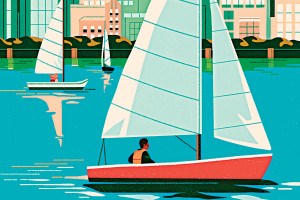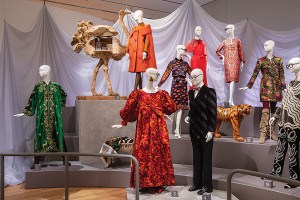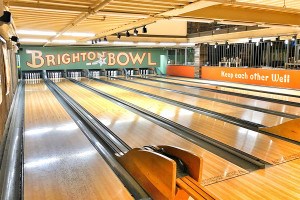The Interview: Boston Symphony Orchestra Head Gail Samuel
The new head of the Boston Symphony Orchestra is a California girl with tons of experience and celeb cachet. Can she remake the institution for a new generation?

Photo by Ken Richardson
Gail Samuel has yet to get stuck in one of Boston’s legendary traffic snarls or shiver through our icy-cold winters, but in the short time she’s been here, the BSO’s recently appointed president and CEO has embraced her role as the city’s newest cultural ambassador. Since heading East in June, the former COO of the Los Angeles Philharmonic has helped oversee the return of live performances to Tanglewood and is set to welcome audiences back to Symphony Hall on September 30. Speaking to us from her office at Tanglewood, she gave us the 411 on what it was like to trade palm trees for brownstones, her most exciting Hollywood moments, and the importance of music—even ’80s pop.
So first of all, what do you miss the most about L.A.?
Oh, that’s easy. My family.
You oversaw the L.A. Philharmonic’s operations at the Frank Gehry–designed Walt Disney Concert Hall, the Hollywood Bowl, and the Ford. Is Disney Concert Hall the coolest building there?
Absolutely. It’s one of those buildings where, I would walk to lunch sometimes, and I’d be coming back, and I’d look up and just think, Even after 10 years, I am so lucky I get to work in that building.
The Hollywood Bowl is such a storied place. Is there a legendary concert there you would’ve loved to have seen?
Judy Garland, in the rain. I don’t remember what year it was, but there’s this great photo. I don’t actually know how they got it, because it seems like it’s taken from very high up, and it’s pointing down at the stage and that iconic shell. At one time there was a pool in front of the Holly-wood Bowl with fountains. And over the pool there was this ramp they’d built out, and there’s this tiny person standing on it. It’s Judy Garland. I think seeing that would have been absolutely amazing.
What is it about the classical-music world that drew you to becoming an impresario?
Gosh, “impresario” seems like such a strong word. I did study violin when I was young, and my parents were both music teachers, so classical music was a big part of my life. But I knew, when I got to college, that I didn’t want to be a performer, and I started studying music and psychology together, thinking that was something that might be interesting to me. And when I finished college, I didn’t really know what I was going to do. My mom said to me one day, “What about orchestral arts management?” I just sort of started doing it, and it just ended up making sense.
Your husband, the actor William Christian, was on All My Children for many years. Do you still watch it?
[Laughs.] All My Children isn’t on the air anymore. I think it wrapped. I hope I’m right about that.
You are. It survived online for a bit, but it’s over—although there is talk of a potential spin-off. Were you a big fan when your husband was on it?
I watched it a few times, but I worked during the day. I wasn’t a soap opera watcher.
I know you haven’t spent a lot of time in Boston yet, but have you found that the traffic is as bad as in L.A.?
Everything I’ve experienced so far in Boston has been pandemic traffic, so I haven’t.
Welcome to Boston! So do you still play the violin?
No, I don’t. I stopped quite a long time ago. I think for me, you know, I’m around people who perform music at such a high level, all the time, that I get my fulfillment there, and it would be hard to enjoy playing again up against that.
Do you have any musical guilty pleasures? K-pop? Kenny G?
[Laughs.] Eighties bands. Styx anthem rock. Also, bands like the Go-Go’s and Culture Club. In fact, I will tell you: One of my biggest celebrity moments probably was when I got to meet Boy George.
You’ve met or worked with so many incredible people. Do you ever get star-struck?
Yeah, the Boy George moment was one of them. I was with a friend who said, “You are totally being a fangirl right now.” But I have met a lot of people over time. Somebody I got to meet very, very early in my career at the L.A. Phil was Cab Calloway. I just look back on that and think, “Holy cow! That was pretty amazing.” And then more recently, I got to meet Snoop Dogg, and he’s just so cool.
At the L.A. Phil and especially the Hollywood Bowl, would you be walking through and suddenly see somebody like George Clooney in the audience?
Oh, yeah, but I mean, you’re in Los Angeles. There are celebrities everywhere, and the Holly-wood Bowl is just everybody’s cool summer place to go, so that was a pretty normal occurrence.
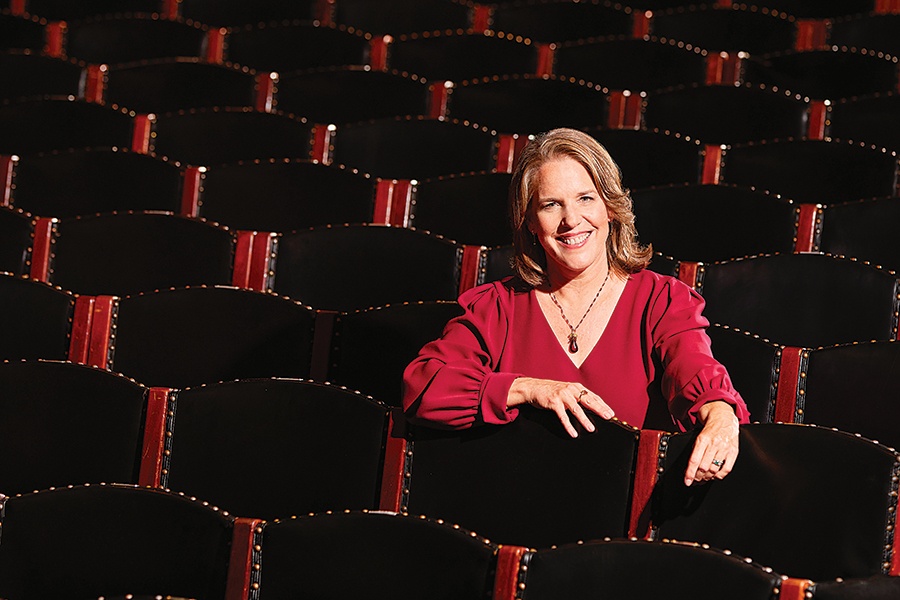
Photo by Ken Richardson
What do you think sets outdoor music apart from music in a concert hall?
Well, right now, I’m sitting here at Tanglewood, looking out my office window at this beautiful scene. And just last weekend, instead of sitting in the Shed, I sat out on the lawn for a concert, which I hadn’t had a chance to do before. I think it’s the combination of the beauty of nature and the beauty of art, and the way they combine. That can be in a place like Tanglewood, which is more remote, or in a very urban park like the Hollywood Bowl, and you still somehow have that sense of connecting to nature. I don’t know if it’s the size of the sky above. I think there’s something more relaxed about it, which is wonderful.
Are you looking forward to spending your summers in the Berkshires?
I am. I mean, being here is just so beautiful. You know, this summer, it was on the heels of so much change: getting to Boston, and being there for about two weeks, and then coming out here to Tanglewood. But you do feel like you have this chance to take a breath. It’s gorgeous, even with all the rain we’ve had this year. I also just like the idea of cycles in life, and I think for me, moving out here for the summer will give an interesting sense of a new cycle.
Do you ever attend musical performances in your spare time, or is that a busman’s holiday for you?
I don’t very often in my spare time, because I have access to so much wonderful music all the time at work. But I appreciate going to the theater, and other sorts of experiences. I am a musical theater fan.
Anything you were surprised to discover upon moving to Boston?
Actually, I’ve been surprised by how incredibly welcoming everyone has been. Not that I expected them to be awful. I just didn’t expect them to be as warm.
Have you ever contemplated collaborating or working with your husband?
William did a narration with the L.A. Phil once, which was a ton of fun. That was great, and he actually has done a bit of narration for the youth orchestra my parents run. I always love seeing him on stage. Any stage.
So we can expect him to read “’Twas the Night Before Christmas” at the Holiday Pops?
[Laughs.] That’s not an immediate plan. But I could see him maybe playing Santa Claus.
Earlier in your career, you were at the Boston University Tanglewood Institute. Is this kind of a homecoming, or full circle, of sorts?
It is, in an unexpected way. I spent three summers here, one as a student and then working as assistant orchestra manager and librarian, which was my title. And even before that, I had this early moment. Because my parents were both public school music teachers, they would take the summer off and we would go places, and eventually, we started driving all the way across the country. One day, we ended up at Tanglewood and spent a day here. It was Leonard Bernstein conducting, and Midori was the soloist. Really, from that one day, I just wanted to find a way to come back. So, yes, it’s an unexpected feeling of full circle. It’s wonderful. And it’s weird, you know, to be sitting in the office I sit in now, and looking at the place through very different eyes. But physically, this place doesn’t look that different. It’s grown a lot since then, certainly, but the trees still look the same as I remember.
Do you envision adding to the scope of the BSO?
I’m sure there will be major undertakings in my tenure here. What those will be, I don’t know yet. There are all of these wonderful, big parts and brands and pieces, and there’s the Linde Center for Music and Learning, among others, and they clearly fit together beautifully, but the question of how we can use all those parts to advance the art form and our connection to our communities is something I’m thinking a lot about.
What was your initial meeting with music director Andris Nelsons like?
Andris is just such a warm person, and we had a great conversation. He and I had not crossed paths previously, so having the chance to sort of recognize each other’s careers and talk about how we might work together was really exciting, and he was just very kind.
You must have had some kind of relationship with John Williams, given the L.A. connection?
Yes, I have, because John has been at the Hollywood Bowl many times. I think every year that I was there. I’ve worked with John, and it was great seeing him and having him here at Tanglewood this summer. It’s a place that he clearly loves a lot, and it was so great to connect with him here.
Where do you think winter is more unpleasant: Boston or Minnesota, where you once held a position with the Minnesota Orchestra?
[Laughs.] Oh, I don’t know. I think Minnesota gets colder. My first year in Minnesota, there was a snowstorm on Halloween. It was my first snowstorm ever, because I really never lived anywhere with that kind of snow, and 36 inches dropped by the end of it. The next time you saw the ground was in May. The snow seriously did not melt until May. But winter. Yeah. My kids keep saying to me, “Why is the first thing everybody talks about with us the winter?”
Overall, how important do you think the arts are in education?
Like I’ve said, I’m the child of two public school music teachers, so for me, I think it’s critical, and I think it’s sad that as a country, we’re not united in that across our public school systems.
In Boston, we have only one public high school dedicated to the visual and performing arts: Boston Arts Academy. Thoughts on that?
Well, in L.A. there are a couple. There’s L.A. County High School for the Arts, and there are a couple of magnet schools for the arts. I think when you talk about the whole person, it works both ways: Artists need a broad education that connects to other things, and everybody benefits from having culture and art in their lives.
How has the return of live performances affected you?
The Pops concert on the Fourth of July was exciting and thrilling. It was the first sitting down and hearing live music with other people that I had done after all of those months. And then a few days later, I was at the first rehearsal at Tanglewood, where I really had the opportunity to say hello to the orchestra. As I was walking through the Shed, I thought, I’m going to hang out a little bit and then head back to my office. And when I heard the first notes of Beethoven’s Fifth Symphony, it hit me in my core, like Oh, my gosh, there’s an orchestra, all together, playing! I was surprised by how deeply it struck me.
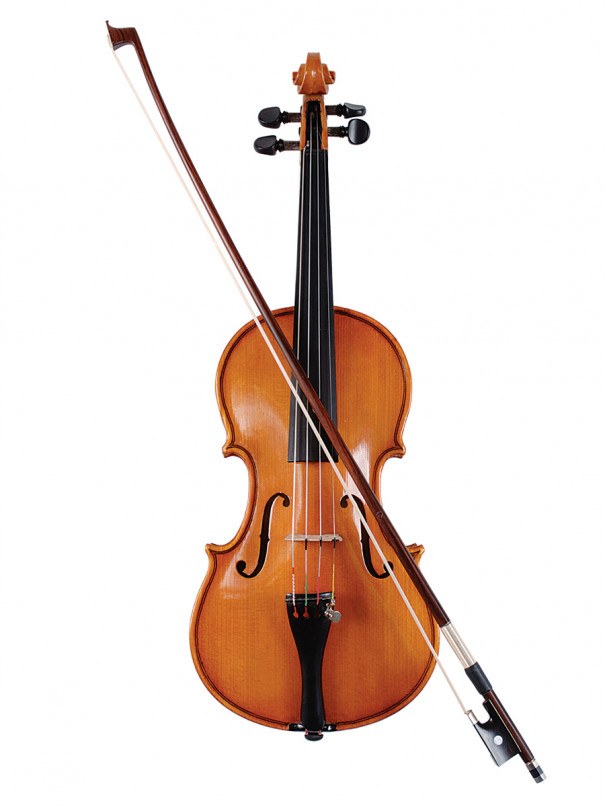
Photo by Wolfgang Filser/Eyeem/Getty Images
By the Numbers
Bittersweet Symphony
Charting 140 years of highs and lows at the BSO.
1881
Year that Henry Lee Higginson founded the Boston Symphony Orchestra.
30
Number of BSO members, including conductor Karl Muck, who were detained during World War I and sent to the Fort Oglethorpe Internment Camp.
1
Number of women who had been named to a principal chair at a major U.S. orchestra before the BSO appointed Doriot Anthony Dwyer principal flutist in 1952.
$70,000
How much less principal flutist Elizabeth Rowe says she was paid per year than the male principal oboist in her 2018 gender discrimination lawsuit against the BSO.
11
Number of Grammys the BSO has won.
